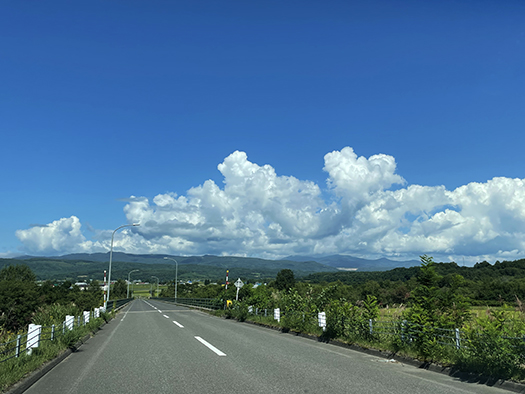
きのうから人によっては9連休という方も多いようです。カミさんとあちこちと遠出していましたが、ふだんのドライブとは勝手の違う運転者も多いので、要注意ですね。
自分ではルールに則った運転をしていても、ふだんあんまり運転していない人が、ふだんあんまり走ったことのない道をノロノロとか、暴走とか、いろいろあるので気を抜けません。みなさん安全運転で。
さすがに盛夏でセミの時雨がドライブコースに木霊し続けている。
「木霊」と書いてみて、まさにセミってそのように表現するのが的確ではないかと気付いた。深い森全体から、その周辺の地中を生き続けた末に、特定の木に留まっていのちの咆哮を上げ続ける。1匹のちいさないのちの叫び声が、合唱となって森全体に響き渡ってくる。まさに「木霊」。
種としてのイキモノ全体の本然のままが、ふかく刺さってきて仕方がない。西行さんはこういうセミ時雨にどんな詩を読んでいたかなぁ、などと脳内を探してみるけれど、不勉強で一句も浮かんでこなかった。あとで調べてみたらこんな句があった。
水の音に暑さ忘るるまといかな
梢のせみの声もまぎれて
・・・漂泊の僧となった西行法師は日々和歌を詠み花鳥風月への耽溺を深めていく。ゆえに解脱し得ず六道輪廻を彷徨う。この詩では水が主テーマでセミはその付随対象。・・・
太古から人間はかれらの木霊に接してきて、それが輪廻転生の定めであることを知り続けてきている。そういう知見から季節のひとつの極限を知って、お盆とか彼岸とかという宗教的な言霊をそれに冠してきたのではないだろうか。たしかに万物自然の「至る季節」という感覚があったのだろう。
写真はきのうのドライブの途中、ムクムクと湧き続けてくれた入道雲に、心がとらわれ続けて、ひょっとしてこのカーブを曲がったら、と期待していたらまさにその通りのタイミングでこちらに微笑み返してくれたショット。こういう瞬間の美感に癒されている。
空と大地は、この北海道の地でその季節季節で雄大にパノラマを見せてくれるけれど、だんだんとこういった雲の有様などにこころが導かれるようになってくる。そしてそういう心理には同時に少年期に感じていたこころ模様がオーバーラップもしてくる。
盛夏を知らせるセミ時雨、まだ数日は楽しめそうですね。
English version⬇
It seems that many people have been on a nine-day weekend since yesterday. My wife and I were out for a long drive here and there, but I have to be careful because there are many drivers who are not used to driving like normal drivers. Even if you are driving according to the rules, there are many drivers who are not used to driving and who drive very slowly on roads they have never driven before, or who drive out of control. So please drive safely.
It is indeed mid-summer, and the cicadas are still singing on the driving course. When I wrote the word “spirits,” I realized that cicadas are aptly described as such. The cicada’s cry of life echoes throughout the forest as a chorus. It is truly a “spirit of the trees.
The true nature of the entire creature as a species is so deep and piercing that it cannot be helped. I wondered what kind of poems Saigyo-san read in this kind of semi-rainstorm, but I could not come up with any poems due to my lack of study. Later, I looked it up and found this poem.
The sound of the water makes me forget the heat.
The sound of cicadas in the treetops is muffled
Saigyo Hoshi became a monk drifting in and out of Japan, composing waka poems every day and deepening his indulgence in flowers, birds, wind, and moon. Unable to attain liberation, he wanders through the cycle of reincarnation in the six realms. In this poem, water is the main theme and the cicada is the incidental object. The Cicada is a concomitant object.
Since ancient times, humans have been in contact with their spirits and have come to know that this is the destiny of reincarnation. From this knowledge, we have come to know one of the extremes of the seasons and have given it the religious term “Higan” (the other shore). Indeed, he must have had a sense of “the season that leads to the end” of all things in nature.
The photo was taken during a drive yesterday, when I was hoping to catch a glimpse of the iridocumulus clouds that kept bubbling up, and when I rounded this curve, they smiled back at me at exactly the right moment. I am soothed by the beauty of moments like this.
The sky and the earth show us a magnificent panorama in Hokkaido in every season, but gradually my mind is being guided by the clouds and the like. At the same time, the mental pattern of my childhood also overlaps with this kind of mentality.
I think we can still enjoy the cicadas that signal the beginning of midsummer for a few more days.
Posted on 8月 11th, 2024 by 三木 奎吾
Filed under: 日本社会・文化研究







コメントを投稿
「※誹謗中傷や、悪意のある書き込み、営利目的などのコメントを防ぐために、投稿された全てのコメントは一時的に保留されますのでご了承ください。」
You must be logged in to post a comment.